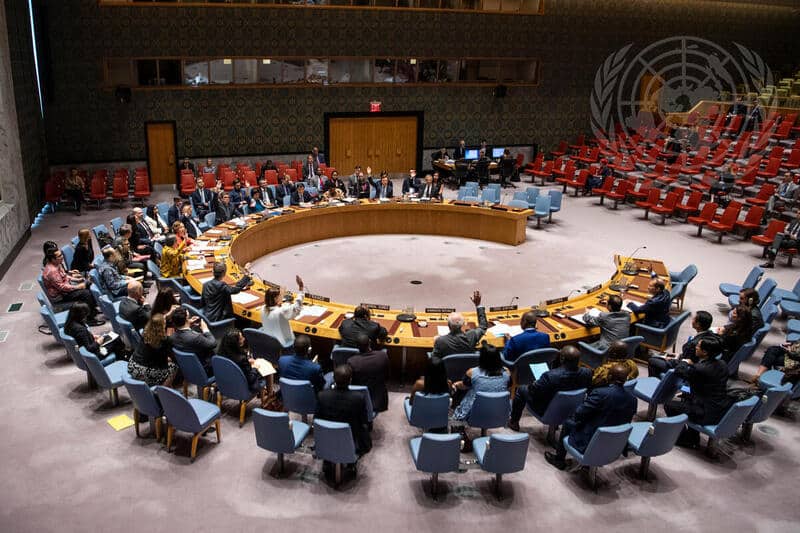UN Security Council Extends Sudan Panel Mandate

The United Nations Security Council has made a significant decision regarding the ongoing crisis in Sudan. On March 12, 2026, the Council extended the mandate of the Panel of Experts that assists its Sanctions Committee concerning Sudan. This extension comes amid escalating violence and humanitarian challenges in the region. The Council adopted resolution 2772 (2025) with a vote of 13 in favor and two abstentions from China and the Russian Federation. The resolution emphasizes the need for continued monitoring and reporting on the situation in Sudan. The Panel is expected to provide a final report on its findings and recommendations by January 13, 2026. This decision reflects the international community’s commitment to addressing the complex issues facing Sudan, including the need for a civilian-led political alternative to the ongoing conflict.
Key Responsibilities of the Panel of Experts
The Panel of Experts has several critical responsibilities under the renewed mandate. It is tasked with providing the Security Council Committee established by resolution 1591 (2005) with an interim report on its activities by August 12, 2025. Additionally, the Panel must submit updates every three months to keep the Committee informed of its findings. This regular reporting is vital for understanding the evolving situation in Sudan, especially as violence continues to impact civilians. The Council has also expressed its intention to review the Panel’s mandate and consider further extensions by February 12, 2026. This proactive approach aims to ensure that the Panel can adapt to the changing dynamics on the ground and provide timely recommendations for action.
The United States, as the main author of the resolution, highlighted the importance of the Panel’s independent reporting. This reporting is crucial for facilitating support for Sudan and addressing the humanitarian crisis. The Panel’s work is expected to provide unique insights into the flow of arms and funds, which are critical to stopping the violence. The representative of the United Kingdom echoed these sentiments, emphasizing the need for the Council to remain focused on protecting civilians amid ongoing attacks. The Panel’s role is essential in promoting accountability and ensuring that the international community remains engaged in efforts to resolve the conflict.
Concerns Over the Current Sanctions Regime
Despite the renewal of the Panel’s mandate, several Council members expressed concerns about the alignment of the Panel’s reporting period with the sanctions measures imposed on Darfur. Some members noted that the current misalignment could hinder effective monitoring and reporting. The representative of Guyana, speaking on behalf of several nations, urged the Council to address this issue. They emphasized that the unique misalignment of the sanctions regime in Darfur must be corrected to ensure that the Panel can operate effectively.
Moreover, the representative of Pakistan expressed disappointment that the opportunity to align the reporting period with the sanctions regime was missed. He criticized the resolution for being put to a vote without accommodating the views of all Member States. The Russian Federation’s representative also voiced concerns, stating that it is unacceptable for the Panel to draft reports beyond the sanctions regime’s timeline. These concerns highlight the need for a more cohesive approach to sanctions and monitoring in Sudan, ensuring that the measures in place serve their intended purpose without causing unintended harm.
Calls for Cooperation and Future Actions
The Security Council’s resolution encourages all parties, including Member States and international organizations, to cooperate with the Panel of Experts. This cooperation is essential for ensuring the safety of the Panel’s members and the effectiveness of their work. The representative of the United States emphasized that the Panel’s independent reporting will facilitate support for Sudan and contribute to efforts aimed at resolving the conflict.
As the situation in Sudan remains precarious, the Council’s commitment to regular updates and reviews of the Panel’s mandate is crucial. The ongoing violence, arms flows, and recruitment of children into armed groups underscore the need for sustained monitoring. The representative of Guyana highlighted that conflict resolution requires a comprehensive approach, and sanctions alone may not be sufficient to restore peace and security. There must be a clear pathway for lifting sanctions, with periodic evaluations to ensure they are effective and do not cause unintended consequences. The international community must remain engaged and responsive to the evolving situation in Sudan, working collaboratively to support a peaceful resolution to the crisis.
Observer Voice is the one stop site for National, International news, Sports, Editor’s Choice, Art/culture contents, Quotes and much more. We also cover historical contents. Historical contents includes World History, Indian History, and what happened today. The website also covers Entertainment across the India and World.

